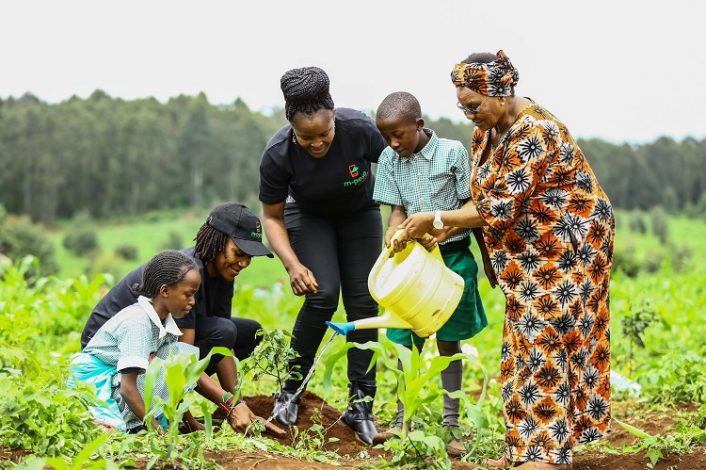The Sustainable Inclusive Business (SIB-Kenya), Kenya Private Sector Alliance (KEPSA) has released a report dubbed “Change the Story: Developing a Local Carbon Market in Kenya”.
The report describes the current situation, reflects on the opportunities for a Kenyan carbon market, and comes just days after the 2023 Earth Hour celebrations. It has been published in partnership with the global Sustainability Consultant Group, TheRockGroup.
Climate change and biodiversity are complex, global, and interconnected issues. This report is limited to the role of the Kenyan private sector in the voluntary carbon market (VCM) with a focus on nature-based solutions (NBS) in addressing global warming, biodiversity loss, and deforestation. It is part of the Change the Story project by SIB-Kenya, which focuses on NBS because of the extra benefits they provide to biodiversity conservation, the protection of landscapes, and community development.
According to Shell and BCG, the global carbon credits market is booming, with an estimated turnover of US$2 billion in 2021 and a prediction of 10-40 US$ billion in 2030.
Closer home, Kenya ranks number 8 on the list of countries selling carbon credits from Nature-Based Solutions, according to the Voluntary Carbon Market Overview 2022 by ClimateFocus.
At the Kenya Carbon Market Roundtable held in January 2023, KEPSA noted that Kenya has the potential to sequester, reduce, or avoid ~30 Mt CO2e/yr (metric tons of carbon dioxide equivalent per year); mobilize up to $600 million annually from regulatory compliance and voluntary carbon market (VCM) projects by 2030 using an average price of $20 per ton. From 2016 to 2021, Kenya issued ~26 Mt CO2e of carbon offsets, more than any other African country and approximately 20 per cent of total African credits.
“We’re encouraged that the government, the private sector led by KEPSA, and a wide array of the conservancy, agricultural and reforestation organizations are all eager to regreen Kenya and fight imminent threats associated with global warming, like drought, loss of biodiversity, and failing harvests,” said Ebenezer A. Amadi, the Program Manager at SIB-Kenya. He added that an effort to streamline the domestic carbon market alongside the ongoing export of carbon credits is a worthwhile and timely course.
The report shows massive potential for carbon sequestration, with growing global demand. However, the export-focused policy in Kenya leaves Kenyan companies in the dark about domestic offsetting options. Notwithstanding the ongoing debate about the benefits of the growing market for carbon credits, Kenya does not have a solid legal framework that would restrict credits to be issued or bought, no taxing credits nor introducing a mandatory carbon emissions market.
Nonetheless, the Government has set up a technical working committee to support the implementation of Article 6 of the Paris Agreement to leverage the carbon market to raise resources that will support adaptation and mitigation measures toward addressing climate change. The Government has been noted to be firmly in favour of an active role of the private sector in reforestation and afforestation initiatives.
“New suppliers are struggling to access the market because they are unsure how to approach buyers and have little experience auditing their projects. On the demand side, we only found scattered examples of Kenyan companies purchasing carbon credits. That would explain why most Kenyan companies often set targets based on the number of trees planted or square km covered rather than in tons of CO2 sequestered,” highlights Jos Reinhoudt, author of the report and a Sustainability Consultant.
A section of Safaricom’s Annual report, 2022, reads, “The remaining 26% of our carbon emissions will be offset through our reforestation programme. We have committed to growing five million trees in degraded public forests in five years and have planted over one million trees in Kieni forest, South Marmarnet, Nandi South, Kakamega, and Port Reitz.”
This approach has been reinforced by Valentine Cheruiyot, Manager-Climate and Environmental Management at Safaricom, who confirms that the company pledges to plant 1 million trees annually.
For 75 KES per tree, it would cost the company 75M KES or US$600,000 to offset their 2021 carbon footprint of 66,032 tCO2. This indicates a price of US$ 9.09 per ton of CO2. The report points to Safaricom as a good practice in Kenya due to its transparency about its carbon footprint and its commitment to Science-Based Targets for the climate.
The Government is using the same methodology to stress the importance of carbon capturing with nature-based solutions, evidenced by the tree restoration program at Ngong Hills Forest to combat the effects of climate change in the country.
The initiative aims to plant 15 billion trees by 2032, towards reducing greenhouse gas emissions, stop and reverse deforestation, and restore 5.1 million hectares of deforested and degraded landscapes through the African Landscape Restoration Initiative.
The report is a call to action for the private sector, especially to actively tackle climate change by, among others, incorporating offsetting in their corporate carbon strategy to compensate for greenhouse gas (GHG) emissions that cannot (yet) be avoided. It calls for collective positive action to make the planet better by restoring its glory.



